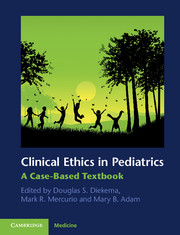Book contents
- Frontmatter
- Contents
- Contributors
- Preface
- Section 1 Core issues in clinical pediatric ethics
- Pediatric decision-making: informed consent, parental permission, and child assent
- 2 Pediatric decision-making: adolescent patients
- 3 Parental refusals of recommended medical interventions
- 4 Adolescent confidentiality
- 5 Refusals of treatment in adolescents and young adults
- 6 Family beliefs and the medical care of children
- 7 Fidelity and truthfulness in the pediatric setting: withholding information from children and adolescents
- 8 Fidelity and truthfulness: disclosure of errors
- 9 Requests for “non-therapeutic” interventions in children: male circumcision
- Section 2 Ethical issues at the beginning of life: perinatology and neonatology
- Section 3 When a child dies: ethical issues at the end of life
- Section 4 Ethical issues posed by advances in medical technology and science
- Section 5 Children, public health, and justice
- Section 6 Special topics in pediatric ethics
- Index
- References
2 - Pediatric decision-making: adolescent patients
from Section 1 - Core issues in clinical pediatric ethics
Published online by Cambridge University Press: 07 October 2011
- Frontmatter
- Contents
- Contributors
- Preface
- Section 1 Core issues in clinical pediatric ethics
- Pediatric decision-making: informed consent, parental permission, and child assent
- 2 Pediatric decision-making: adolescent patients
- 3 Parental refusals of recommended medical interventions
- 4 Adolescent confidentiality
- 5 Refusals of treatment in adolescents and young adults
- 6 Family beliefs and the medical care of children
- 7 Fidelity and truthfulness in the pediatric setting: withholding information from children and adolescents
- 8 Fidelity and truthfulness: disclosure of errors
- 9 Requests for “non-therapeutic” interventions in children: male circumcision
- Section 2 Ethical issues at the beginning of life: perinatology and neonatology
- Section 3 When a child dies: ethical issues at the end of life
- Section 4 Ethical issues posed by advances in medical technology and science
- Section 5 Children, public health, and justice
- Section 6 Special topics in pediatric ethics
- Index
- References
Summary
Case narrative
Daniel Hauser was a 13-year-old boy from Sleepy Eye, Minnesota who, in early 2009, was diagnosed with stage IIB nodular sclerosing Hodgkin disease. Doctors determined that the cancer was readily treatable with chemotherapy, predicting an 80–95% chance of complete remission after 5 years. Daniel was prescribed six cycles of chemotherapy followed by radiation to treat the cancer. Daniel’s parents initially consented to the course of treatment, but abruptly refused to continue treatment after only one round of chemotherapy because of side effects (e.g., fatigue and nausea). The Hausers sought opinions from five other physicians, including three pediatric oncologists, who all strongly recommended continued chemotherapy.
Despite a bleak chance of survival without chemotherapy and radiation, Daniel and his parents refused to continue the prescribed treatment and decided to use alternative therapies. Specifically, Colleen Hauser sought to treat her son with dietary changes and ionized water that would “starve the cancer” from his body (In the Matter of Hauser, 2009, p. 28). The Hausers justified their refusal of further chemotherapy by claiming it would violate the family’s and Daniel’s religious beliefs. Although the Hauser family was not of Native American descent, the family subscribed to the beliefs of Nemenhah, a Native American religious organization. Nemenhah doctrine advocates the use of Native American holistic medical practices, and a central tenet is the principle of “do no harm.” Colleen Hauser, in particular, believed that “God intends for the body to be healed in a natural way.” (In the Matter of Hauser, 2009, p. 29). As such, the Hausers viewed chemotherapy as self-destructive and poisonous. Daniel, himself, asserted that he was a Medicine Man in the Nemenhah tradition, and that use of chemotherapy would violate his religious beliefs and status.
- Type
- Chapter
- Information
- Clinical Ethics in PediatricsA Case-Based Textbook, pp. 7 - 13Publisher: Cambridge University PressPrint publication year: 2011
References
- 6
- Cited by

